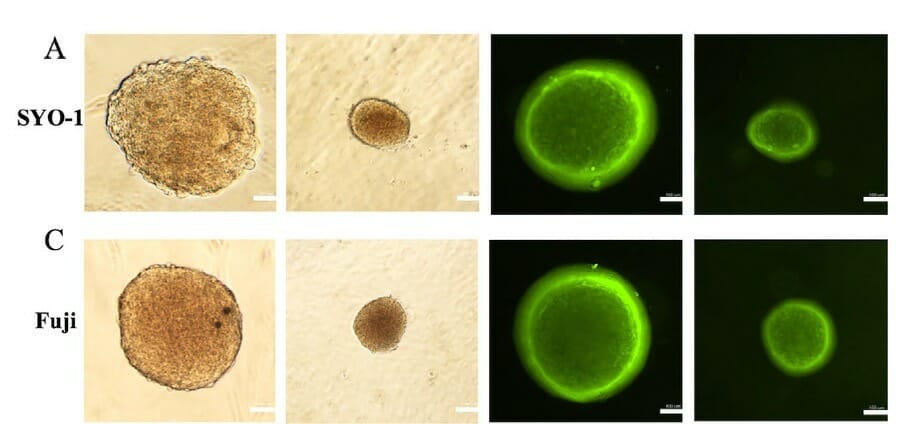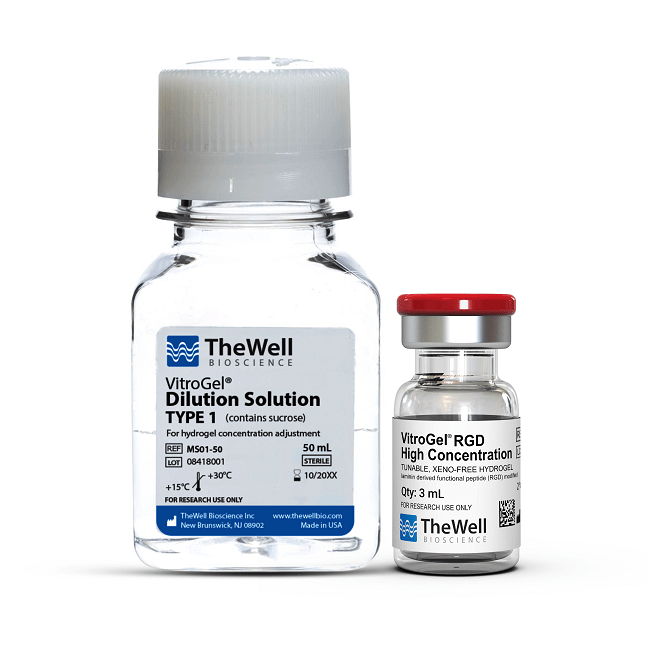Research Highlights
Breaking the (cell) cycle: Introducing CDK9 as a prognostic biomarker and therapeutic target in synovial sarcomas
Repressing CDK9 blocks cell spheroid formation in 3D culture and delays growth of synovial sarcoma cells

Institution:
Carver College of Medicine, University of Iowa, Stony Brook University, Stanford University School of Medicine, Atta-ur-Rahman School of Applied Bio sciences, National University of Sciences and Technology
Team:
Wadi D. Mahauad-Fernandez, Wasifa Naushad, Tyler D. Panzner, Amani Bashir, Geeta Lal, and Chioma M. Okeoma *
Application:
3D tissue model to evaluate role of a gene in tumor progression
Disease model:
Synovial Sarcoma
Cell types:
4T1 shBST-2 OE BST-2D/OE BST-2M cells
Hydrogel:
VitroGel® RGD (TWG003)
Synovial sarcoma is an aggressive malignant mesenchymal neoplasm that accounts for 5–10% of soft tissue sarcomas in childhood and adolescence. Over 90% of these types of sarcomas have been attributed to a balanced reciprocal translocation, t(X;18) (p11.2; q11.2). This translocation results in the fusion of the synovial sarcoma translocation gene (SS18) on chromosome 18 to one of three SSX genes (SSX1, SSX2, or SSX4) on chromosome X. Current treatment options include surgical excision with adjuvant or neoadjuvant radiotherapy, and while Synovial sarcoma is somewhat sensitive to traditional chemotherapeutic alkylating agents, it has a high rate of recurrence and metastasis, and low 5- and 10- year survival rates, highlighting the need for novel therapeutic options for synovial sarcoma.
Given the proliferative nature of cancer cells, the last two decades of research have highlighted the importance of protein kinases as therapeutic molecular targets, as they are typically overactive in cancer cells. In light of recent research which has identified a distinct role for CDK9 in a number of solid tumor cancers, a recent study by Xiaoyang Li and colleagues sought to investigate whether or not CDK9 played a role in elusive synovial sarcomas and could serve as a novel therapeutic target. They began their study by demonstrating that roughly 93% of the patient samples tested exhibited high expression levels of CDK9, and that there is a positive correlation between increased expression levels of CDK9 and poor prognostic outcome. In vitro studies demonstrated that CDK9 is critical in synovial sarcoma cells for growth and survival and that disruption of CDK9 expression can lead to apoptosis and can disrupt cell migration, furthering the notion of CDK9 as a potential therapeutic target. In addition to moderating cell survival and migration, effective treatment must prohibit cells from clustering into tumor spheroids. To evaluate whether manipulating CDK9 was able to regulate spheroid formation, Li and colleagues used TheWell Biosciences VitroGel® 3D-RGD (Cat.#TWG002) to ensure the proper recapitulation of the 3D tumor microenvironment. Their results demonstrated that inhibiting CDK9 disrupted the ability of synovial sarcoma cells to form spheroid clusters, suggesting that targeting this gene could slow disease progression and improve prognosis.
This study highlighted the importance of CDK9 in synovial sarcoma cell pathogenesis. Li and colleagues demonstrated that CDK9 is highly expressed in human synovial sarcomas and that higher expression is correlated with poorer prognosis of patients with sarcomas. Importantly, Xiaoyang also found that CDK9 has an important role in promoting synovial sarcoma cell growth, proliferation, and motility. Previous studies have demonstrated that compared to traditional two-dimensional cell culture, 3D culture provides a more physiologically relevant environment. This means maintaining tissue-specific architecture, mechanical and biochemical cues, and cell-cell or cell-matrix interactions to allow for proper representation of drug effects in in vitro drug therapy studies. TheWell Biosciences VitroGel-3D-RGD has provided the ideal platform for this with their tunable hydrogel system. These 3D studies provide a base for further research to identify the molecular mechanisms by which CDK9 contributes to tumorigenesis and to validate the therapeutic potential of targeting CDK9 for the treatment of synovial sarcomas.
Read full articles:
- Mahauad-Fernandez WD, Okeoma CM. B49, a BST-2-based peptide, inhibits adhesion and growth of breast cancer cells. Scientific Reports, 8(1). https://doi.org/10.1038/s41598-018-22364-z
- Mahauad-Fernandez WD, Naushad W, Panzner TD, Bashir A, Lal G, Okeoma CM. BST-2 promotes survival in circulation and pulmonary metastatic seeding of breast cancer cells. Scientific Reports, 8(1). https://doi.org/10.1038/s41598-018-35710-y
Related Product:


